Prime
Covid-19 shuts out externalisation of labour to citizens

Thousands of Ugandans leave the country annually to seek greener pastures especially in the Middle East. The case has been different this year due to Covid-19. PHOTO/FILE
What you need to know:
- Uganda Association of External Recruitment Agencies (UAERA) profiles attractive monthly remunerations for domestic workers in Saudi Arabia ranging from $225 to $500 (with the provision of accommodation and meals).
Labour externalisation, especially among Ugandan youth who look for jobs in the Middle East, has been the unprecedented causality of Covid-19. The Middle East provides opportunities for several categories of employees, including drivers, domestic workers, factory workers, security, etc.
Uganda Association of External Recruitment Agencies (UAERA) 2020 report indicates that at least 165,000 Ugandans work in these categories in the Middle East.
Also, the International Labour Organisation (ILO) reports show that between 2013 and 2017, the demand for migrant workers in the Middle East increased by 5.2 per cent, mainly attributed to the need for workers in the construction and services sector.
UAERA profiles attractive monthly remunerations for domestic workers in Saudi Arabia ranging from $225 to $500 (with the provision of accommodation and meals).
Factory workers on average earn between $350 and $700 in Qatar, UAE and Saudi Arabia; and those engaged in catering, earn $350-$600 in Qatar and UAE.
Security guards make between £300 to $900, and in high-risk states such as Iraq and Afghanistan, $500- $1,000 per month.
Data from Bank of Uganda shows that Uganda has tremendously benefited from remittances from the Middle East, which increased from $51.4m in 2010 to $309m by 2018.
As of 2018, the region contributed 23 per cent of the remittances, up from 7 percent in 2010. However, the outbreak of Covid-19 has disrupted this seemingly opportune labour market, especially for the unskilled Ugandan youth.
To contain the outbreak in Uganda, the government instituted drastic measures to impose a lockdown. The suspension of labour exportation effective March 18 by the Ministry of Gender, and the subsequent closure of Entebbe International Airport and border points halted international travel, deepening the uncertainty in the labour externalisation sector.
The containment measures adopted in the main destinations, eg Saudi Arabia as well as those adopted in Uganda, limit international travel, thus raising concerns on whether increasing employment opportunities through labour exports, is still a viable source of employment for the youth. Before the pandemic, the UAERA reports show that every month, at least 3,000 migrant workers travelled to the Middle East.
According to the MoGLSD, between 2018 and 2019, more than 70 per cent of migrant workers travelled predominantly to Saudi Arabia and UAE respectively. Currently, travel restrictions have hindered recruits from travelling to the Middle East to work.
The World Bank projects that if this economic downturn persists, a sharp decline in the demand of migrant workers is inevitable and it could result in a rethinking of migration regulations governing work visas. Additionally, the recent wave of layoffs will systematically put migrant workers’ visa statuses at risk, especially the casual and low-skilled labour.
Covid-19 has not only threatened the job security of migrant workers, but also their salaries and the level of remittances, which consequently affects the welfare of their families back home.
As regards health, the migrant workers living conditions continue to deteriorate.
Amnesty International notes that more than six migrant workers share a room in crowded sites. In such a scenario, it is highly unlikely that social distancing rules will be observed.
Therefore, it is not surprising that the World Bank report indicates that migrant workers constitute a considerable share of confirmed cases of Covid-19 in Qatar and Saudi Arabia.
Furthermore, with the loss of jobs, accommodation provided by the employer is forgone, hence turning to temporary housing that is often crowded and unsanitary.
From the gender-based violence perspective, UNFPA stresses that the situation is worse for female domestic workers.

AUTHORSHIP: Ms Aida K Nattabi (above) works with the Economic Policy Research Centre. The article was co-authored by Mr Swaibu Mbowa.




